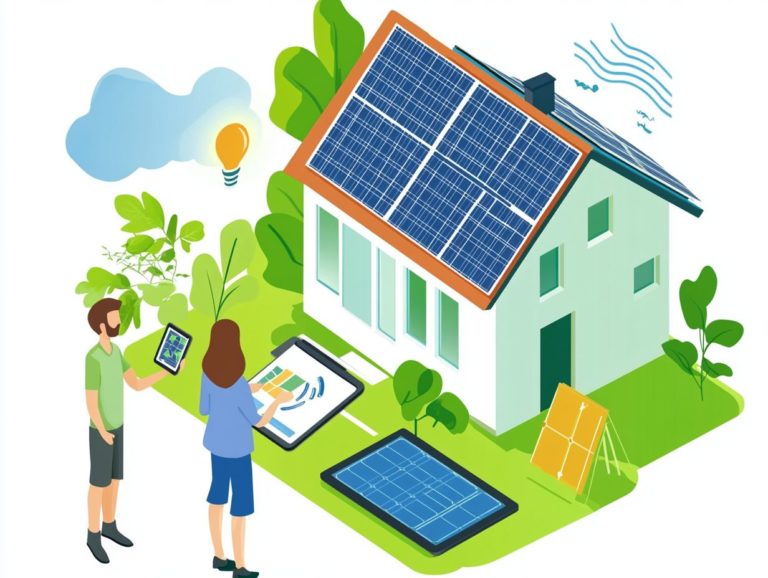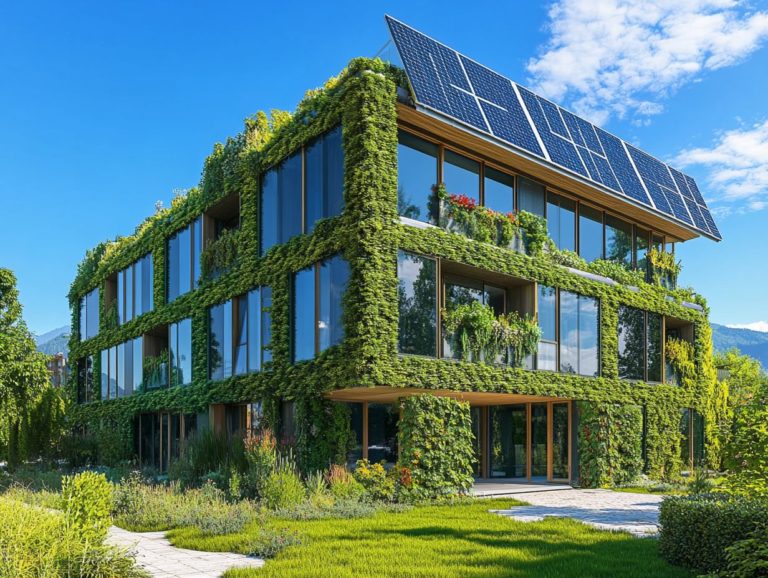What is the Importance of Home Energy Efficiency?
Home energy efficiency isn’t just a trend; it’s an essential element of contemporary living that can yield substantial cost savings while positively impacting the environment.
This article delves into the true meaning of energy efficiency and its effects on both your home and finances. It highlights the benefits of enhancing energy efficiency, identifies the key factors that influence it, and offers practical tips to elevate your home’s performance.
You will also learn about tools that can help you assess and monitor your energy usage effectively. Immerse yourself in this exploration to uncover how small changes can lead to significant improvements!
Contents
- Key Takeaways:
- Understanding Home Energy Efficiency
- Benefits of Improving Home Energy Efficiency
- Cost Savings and Environmental Impact
- Factors Affecting Home Energy Efficiency
- Key Areas to Focus On
- Ways to Improve Home Energy Efficiency
- Assessing and Monitoring Home Energy Efficiency
- Frequently Asked Questions
- What is the Importance of Home Energy Efficiency?
- How can home energy efficiency save me money?
- What natural resources are conserved through home energy efficiency?
- Why is reducing carbon emissions important for my home?
- What are some ways to improve home energy efficiency?
- How does home energy efficiency impact the environment?
Key Takeaways:

- Improving home energy efficiency is essential for cost savings and reducing environmental impact.
- Key areas to focus on include insulation, heating and cooling systems, and appliances.
- Tools and techniques for assessing and monitoring energy usage can help homeowners track and reduce their energy consumption.
Understanding Home Energy Efficiency
Understanding home energy efficiency is essential for homeowners, local governments, and communities striving to curb energy consumption and gases that contribute to climate change.
It involves embracing tools and devices that use less energy to perform the same tasks, yielding substantial energy savings and lowering your utility bills.
By prioritizing efficient energy use, you can decrease your energy costs and play a significant role in reducing energy demand. This approach promotes sustainable practices and supports energy-efficient homes, benefiting both you and your community.
Defining Energy Efficiency and its Impact
Energy efficiency is about using less energy to accomplish the same tasks, enabling you to reduce your energy consumption and cut down on emissions. By embracing energy-efficient technologies, you can enjoy significant savings on your energy bills while keeping your home comfortable and convenient.
This leads to lower utility costs and is vital in combating climate change. Implementing energy-efficient appliances like LED lighting, ENERGY STAR-rated refrigerators, and smart thermostats substantially decreases your electricity usage, helping lessen reliance on fossil fuels.
Investing in efficient insulation and high-performance windows will further minimize your heating and cooling demands. Adopting energy efficiency isn’t merely a wise financial move; it’s an essential part of promoting sustainability and protecting our environment.
As communities globally shift towards greener practices, this transition fosters a healthier planet for future generations.
Benefits of Improving Home Energy Efficiency
Improving home energy efficiency brings a wealth of benefits you can t afford to miss out on! You can experience significant energy savings, reduced energy costs, and impressive environmental perks.
By opting for energy-efficient appliances and technologies, you ll not only lower your utility bills but also make a meaningful contribution to reducing harmful emissions.
Investing in these systems enhances comfort and air quality in your home while yielding long-term economic advantages, such as job creation and greater energy security.
These improvements play a vital role in the fight against climate change, establishing energy efficiency as an essential pillar of sustainable living. Start making changes today and enjoy a more sustainable and cost-effective home!
Cost Savings and Environmental Impact

Cost savings from enhancing your home s energy efficiency can be significant. By opting for energy-efficient products, you effectively reduce your energy consumption. This translates into lower utility bills. Not only does cutting down on energy use save you money, but it also helps minimize greenhouse gas emissions, bringing various environmental benefits.
These financial advantages become even more compelling when you consider the long-term impacts of certain upgrades. Installing Energy Star-rated appliances or high-efficiency heating, ventilation, and air conditioning (HVAC) systems are great examples. Such investments lighten your monthly expenses and boost your property value, making your home more appealing to future buyers.
Using LED lighting and programmable thermostats are prime examples of smart choices that yield substantial savings over time. These choices also reduce reliance on fossil fuels.
By embracing energy-efficient technologies, you play a vital role in the broader mission of combating climate change. You contribute to a cleaner, healthier environment for generations to come.
Factors Affecting Home Energy Efficiency
Several key factors profoundly impact home energy efficiency. These include the quality of insulation, the efficiency of your HVAC systems, and effective energy management practices.
Conducting comprehensive energy audits helps you pinpoint areas of energy waste. You can then embrace energy-efficient solutions, like advanced insulation techniques and HVAC upgrades. Each of these components is crucial for crafting energy-efficient homes that conserve energy, elevate comfort, and lower overall energy costs.
Understanding these elements is vital for any homeowner looking to enhance their residential energy efficiency.
Key Areas to Focus On
Key areas for enhancing your home s energy efficiency include insulation, HVAC systems, and adopting energy-efficient appliances. By prioritizing these elements, you can elevate your energy management game and significantly cut down on energy consumption.
Upgrading your insulation is particularly beneficial. It helps maintain a consistent indoor temperature and reduces the load on your heating and cooling systems. This ultimately slashes your energy costs over time. Regular maintenance and using smart thermostats can optimize your HVAC system, ensuring energy is used wisely for effective climate control.
Choosing energy-efficient appliances allows you to lower your utility bills while making a positive impact on the environment. Implementing these measures creates a comfortable living space and enhances your property value. It also promotes long-term savings and highlights the importance of energy efficiency in new builds.
Ways to Improve Home Energy Efficiency
Homeowners have numerous strategies at their disposal to enhance energy efficiency. These range from straightforward conservation techniques to integrating cutting-edge energy-efficient technologies.
Using smart thermostats, installing heat pumps, and incorporating renewable energy sources helps you take charge of your energy use and enjoy lower bills.
Using energy-saving tips helps reduce waste significantly. This allows you to fully leverage the advantages of energy-efficient appliances and systems.
By making informed choices, you can take meaningful steps toward achieving greater energy efficiency and sustainability in your home. Act now to start saving!
Practical Tips and Strategies

Practical tips and strategies for enhancing home energy efficiency include embracing energy-saving practices and installing smart thermostats. Upgrade to energy-efficient appliances and conduct energy audits to significantly reduce energy consumption.
Check your heating and cooling systems regularly for efficiency. Ensure that all windows and doors are properly sealed to prevent drafts. Integrate energy-efficient LED lighting and utilize power strips to lower your energy bills.
Embrace renewable energy sources like solar panels to boost energy efficiency and enjoy long-term financial benefits. Start adopting these simple methods today to save money and create a sustainable home!
Assessing and Monitoring Home Energy Efficiency
Assessing and monitoring your home s energy efficiency is essential for understanding your energy consumption patterns. This helps in pinpointing areas for improvement.
Energy audits are a powerful tool that evaluates your energy usage. They reveal potential inefficiencies and ensure that your indoor air quality meets health standards.
Use various monitoring techniques to track your energy consumption over time. Evaluate the health impacts of your energy-efficient upgrades. This ongoing assessment enables you to make informed decisions and maintain a healthy living environment.
Ultimately, you ll be on the path to improved energy management.
Tools and Techniques for Tracking Usage
Tools and techniques for tracking energy usage are your secret weapons. These include energy audits, smart meters, and specialized monitoring tools for Heating, Ventilation, and Air Conditioning (HVAC) systems.
Energy audits provide a clear picture of how your home uses energy, allowing you to pinpoint areas where energy waste sneaks in. Smart meters offer real-time data, enabling you to observe usage patterns and adjust your behaviors to optimize those energy bills.
Advanced monitoring tools for HVAC systems ensure that these systems operate at peak efficiency. Together, these methods allow you to take control of your energy consumption, contributing to lower utility costs and a more sustainable environment.
Frequently Asked Questions
What is the Importance of Home Energy Efficiency?

Home energy efficiency is crucial for several reasons, including reducing energy costs, conserving natural resources, and decreasing carbon emissions.
How can home energy efficiency save me money?
By improving your home’s energy efficiency, you can reduce energy consumption and save money on your monthly utility bills.
What natural resources are conserved through home energy efficiency?
Home energy efficiency helps to conserve resources like electricity, natural gas, and water, which are essential for running a household.
Why is reducing carbon emissions important for my home?
The energy used in homes significantly contributes to greenhouse gas emissions. Improving energy efficiency helps reduce your carbon footprint, promoting a healthier environment.
What are some ways to improve home energy efficiency?
To enhance your home’s energy efficiency, consider upgrading to energy-efficient appliances, sealing air leaks, and adding insulation.
How does home energy efficiency impact the environment?
Home energy efficiency directly impacts the environment by reducing the energy and resources needed for household maintenance. This leads to lower carbon emissions and a healthier planet.






